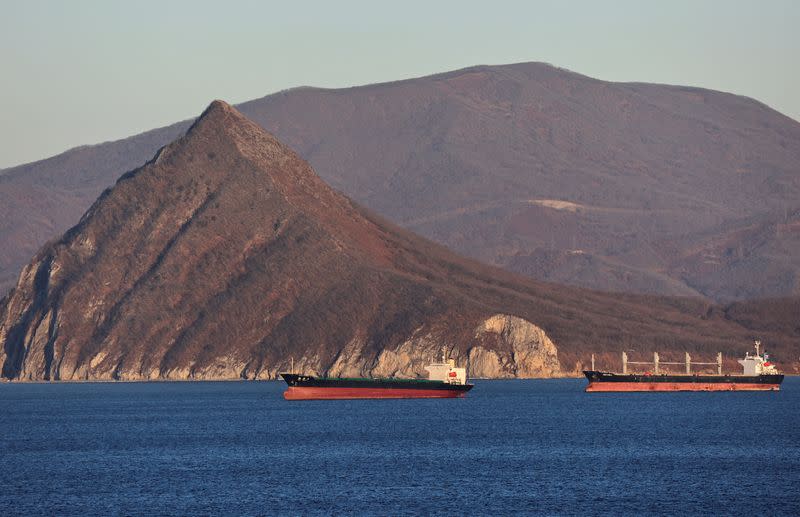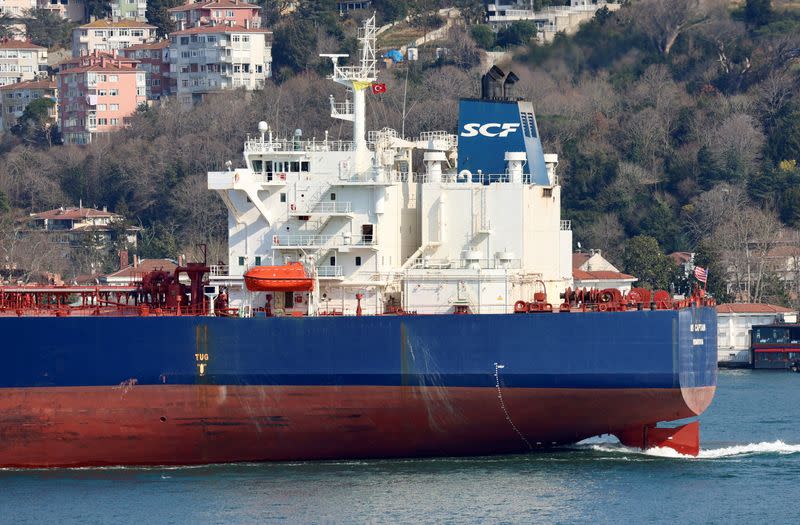Exclusive-Russia struggles to collect oil payments as China, UAE, Turkey raise bank scrutiny
- Oops!Something went wrong.Please try again later.
MOSCOW (Reuters) - Russian oil firms face delays of up to several months to be paid for crude and fuel as banks in China, Turkey and the United Arab Emirates (UAE) become more wary of U.S. secondary sanctions, eight sources familiar with the matter said.
Payment delays reduce revenue to the Kremlin and make them erratic, allowing Washington to achieve its dual policy sanction goals - to disrupt money going to the Kremlin to punish it for the war in Ukraine while not interrupting global energy flows.
Several banks in China, the UAE and Turkey have boosted their sanctions compliance requirements in recent weeks, resulting in delays or even the rejection of money transfers to Moscow, according to the eight banking and trading sources.
Banks, cautious of the U.S. secondary sanctions, started to ask their clients to provide written guarantees that no person or entity from the U.S. SDN (Special Designated Nationals) list is involved in a deal or is a beneficiary of a payment.
The sources asked not to be named due to the sensitivity of the issue and because they are not allowed to speak to media.
In the UAE, banks First Abu Dhabi Bank (FAB) and Dubai Islamic Bank (DIB) have suspended several accounts linked to the trading of Russian goods, two sources said.
UAE's Mashreq bank, Turkey's Ziraat and Vakifbank and Chinese banks ICBC and Bank of China still process payments but take weeks or months to process them, four sources said.
Mashreq bank declined to comment. UAE's FAB and DIB banks, Turkey's Ziraat and Vakifbank, China's ICBC and Bank of China did not reply to requests for comments.
Kremlin spokesperson Dmitry Peskov said payment problems exist when asked about reports that banks in China have slowed payments.
"Of course, unprecedented pressure from the United States and the European Union on the People's Republic of China continues," Peskov told a daily conference call with reporters.
"This, of course, creates certain problems, but cannot become an obstacle to the further development of our trade and economic relations (with China)," Peskov said.
U.S. EXECUTIVE ORDER
The West has imposed a multitude of sanctions on Russia after it invaded Ukraine in February 2022. Dealing with Russian oil is not illegal as long as it is sold below a Western-imposed price cap of $60 per barrel.
Russian oil exports and payments for it have been disrupted in the first months of the war but later normalised as Moscow re-routed flows to Asia and Africa away from Europe.
"Problems returned from December after banks and companies have realised the threat of U.S. secondary sanctions is real," one trading source said.
The source was referring to a U.S. Treasury executive order published on Dec. 22, 2023, which warned it could apply sanctions for the evasion of the Russian price cap on foreign banks and called on them to boost compliance.
It became the first direct warning about a possibility of secondary sanctions on Russia, putting it on par with Iran in some areas of trade.
Following the U.S. order, Chinese, UAE and Turkish banks that work with Russia have increased checks, started asking for extra documentation and trained more staff to make sure deals were compliant with the price cap, the trading sources said.
Additional documents can also include details on the ownership of all companies involved in the deal and personal data of individuals controlling the entities, so that banks can check on any exposure to the SDN list.
In the end of February UAE banks had to rise payment scrutiny as they were asked to provide data to the U.S. correspondent banks and the U.S. treasury if they have transactions that go to China on behalf of a Russian entity, according to one banking source familiar with the matter.
"This meant delays in processing payments to Russia," one of the sources said.
One source said one payment had been delayed by two months, while another said the delays amounted to two to three weeks.
"It has become tough and not even for the dollar transactions. Sometimes it takes weeks for a direct yuan-rouble transaction to be executed," one of the traders said.
(Reporting by Reuters reporters in MOSCOW, Aizhu Chen in SINGAPORE, Engen Tham in BEIJING, additional reporting by Ziyi Tang, Florence Tan, Can Sezer, Jonathan Spicer, Federico Maccioni, Nidhi Verma, Hadeel Al Sayegh and Kevin Huang; editing by David Evans)


